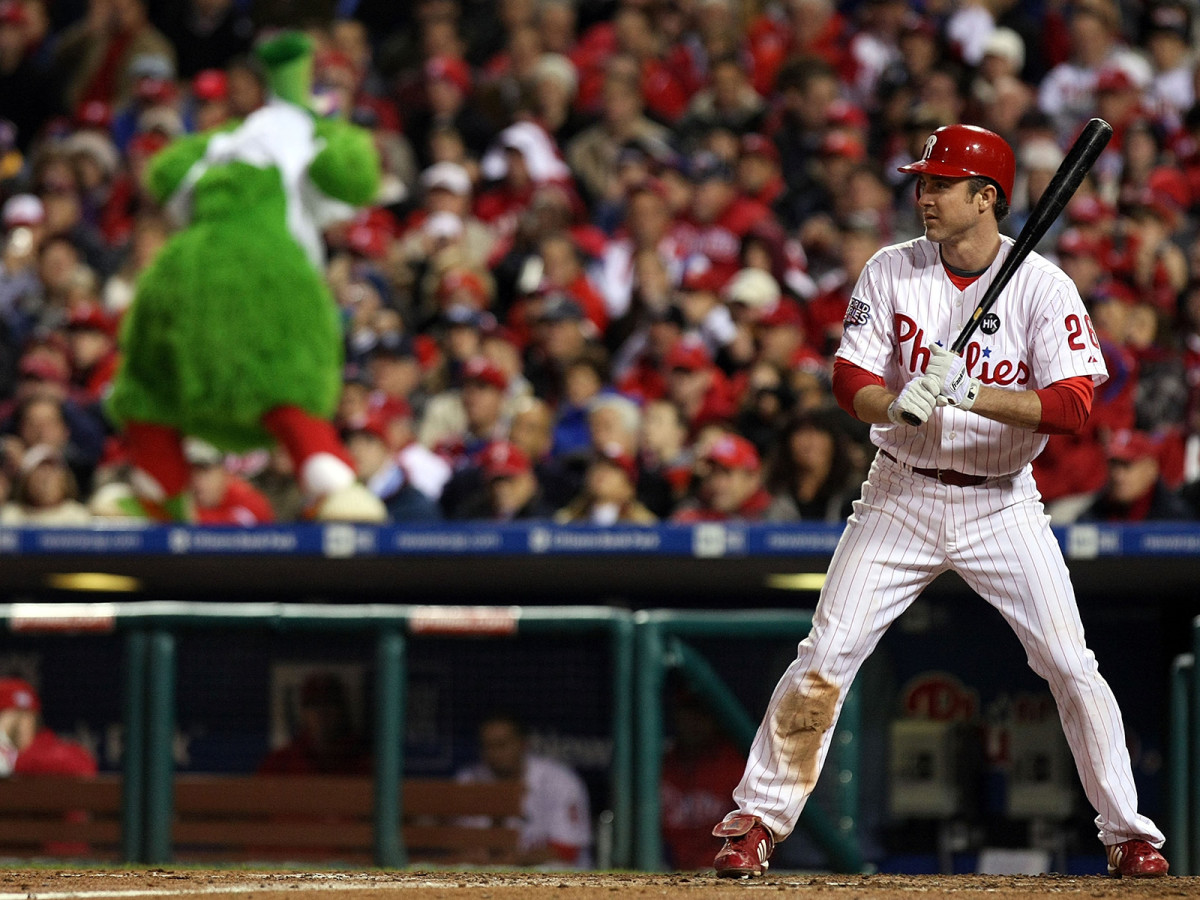With Retirement on the Horizon, Has Chase Utley Done Enough to Reach Cooperstown?

The Chase has come to an end. On Friday afternoon, veteran Dodgers second baseman Chase Utley announced that he’s calling it quits after 16 years in the big leagues. The longtime Phillies star will hang up his spikes at the end of the season, just shy of his 40th birthday, bringing an end to a career as one of the best offensive second basemen in the game’s history—yet one that might not be enough to get him into the Hall of Fame.
From his first season as a regular for Philadelphia in 2005 through 2010, there was no better second baseman in baseball than Utley. Over those six years—the last five of which saw him make the NL All-Star team—the former first-round pick out of UCLA hit .298/.388/.523 with a 133 OPS+. Among all regular second basemen in that span, that batting average ranks fourth, while his on-base, slugging percentage and OPS+ were tops at the position.
Utley was more than just a good hitter, though. He was a plus defender at his position by both Defensive Runs Saved (an average of +19 over those six seasons) and Ultimate Zone Rating. As a baserunner, he was also elite, swiping 90 bags in 102 chances over those years—an 88.2% success rate that was second only to teammate Jimmy Rollins (and by a mere tenth of a point) among all players with at least 100 attempts in that time.
All of that helped him compile a terrific 45.5 Wins Above Replacement from 2005 through ’10. That’s nearly double what the next closest regular second baseman, Baltimore’s Brian Roberts, totaled in that same span (24.2), and more than Robinson Cano and Dustin Pedroia put together. Unsurprisingly with that kind of production, he was a key cog of a Phillies team that steamrolled the rest of the Senior Circuit in that time, piling up five straight NL East crowns from ’06 to ’10, two pennants, and a World Series title in ’08—the franchise’s first since 1980, and one which he celebrated with one of the more emphatic and beloved f-bombs in history. Rollins and Ryan Howard won the MVP trophies, and Cole Hamels made fans swoon, but Utley was quietly and secretly the team’s best player. It’s no wonder why he got the love from Mac in It’s Always Sunny In Philadelphia.
Unfortunately for Utley (and, I suppose, for the denizens of Paddy’s Pub), the good times came to an end right as the new decade began. Injuries and aging slowed Utley down significantly—from 2011 through ’14, he hit a more mortal .269/.347/.433 and totaled just 14.2 WAR—and while he was able to earn one last All-Star nod in ‘14 off a strong first half, he cratered after that. So did the Phillies, declining alongside him as they went from NL powerhouse to bottomfeeder thanks to an old, top-heavy roster. By August of 2015, Rollins and Hamels were both gone, and Utley soon joined them, getting dealt to the Dodgers midway through that month.
Utley’s Los Angeles stint has been mostly ineffective, as he hit just .239/.316/.387 with the team, mostly as a reserve. His most notable moment in Dodger blue was also his most infamous, when he barreled into Mets shortstop Ruben Tejada with a late and hard slide while trying to break up a double play in Game 2 of the 2015 Division Series. The play led to a Los Angeles comeback (though the team lost the series in five games) but also broke Tejada’s leg, earning Utley a two-game suspension and the white-hot enmity of Mets fans from here until the death of our solar system (or at least, an increase in the latter, given how much fans in Queens already hated him for his long domination of the team while with the Phillies). The play’s lasting legacy will be as the impetus for the outlawing of slides that are outside of the base and/or directly at a fielder—officially designated Rule 6.01(j) in MLB’s dense legalese, but now and likely forever informally known as the Chase Utley Rule.
The Star That Still Won't Shine: The Incredible, Unprecedented but Unseen Greatness of Mike Trout
That regrettable moment aside, Utley’s Dodgers tenure has seen him transition from dynamic player into a mentor for the team’s young stars—in particular, 2016 NL Rookie of the Year Corey Seager, who became his brightest student. Virtually any recent story about Utley from ’16 onward is full of odes to his grit, leadership, blue-collar work ethic, and other intangibles that are part of his borderline insane mindset and commitment to fundamentals. Consider this positively bonkers story from Peter Gammons in which Utley asked another team’s pitcher to drill him on purpose in a game so as to show a younger player who’d stolen a base earlier and celebrated a little too much that there were consequences for such things. Or, in that same piece, that Utley once disguised himself as a batboy to deliver balls to the home plate umpire during a Clayton Kershaw start so he could plead with the ump to give Kershaw some borderline strikes.
None of that should overshadow, though, just how good Utley was. While his overall line will likely take a slight hit by season’s end, he’ll still go down as one of MLB’s best hitters at the keystone. His 117 OPS+ in 7,823 career plate appearances is tied with Lou Whitaker for eighth best among all second basemen with 1,700 or more games played at the position. His 259 homers rank sixth, his .466 slugging percentage is fifth, and his 1,880 hits are good for 14th overall. His 65.6 WAR, meanwhile, places him 12th all-time at second base, sandwiched between Willie Randolph (65.9) and recent Hall of Fame inductee Craig Biggio (65.5), though Utley is more likely to fall behind the latter than pass the former by year’s end.

Will those numbers be enough for a plaque of his own in Cooperstown, though? By Jay Jaffe’s JAWS system—which measures players against enshrined Hall of Famers by averaging career WAR and seven-year peak WAR for a JAWS score—Utley is just on the edge of Hall worthiness. His 65.6 career WAR is a few points shy of the average Hall of Fame second baseman, but he’s ahead of the pack in peak WAR at 49.3; his resultant JAWS of 57.4 is a smidge above the position’s current 57.0 benchmark. As such, he ranks smack in the middle of Cooperstown’s 20 second basemen, and of the nine men ahead of him in JAWS, only two—the still active Robinson Cano and snubbed Angels star Bobby Grich—aren’t enshrined.
The rate stats are on Utley’s side, but there’s one number that may sink his Hall chances. No hitter with fewer than 2,000 career hits in the post-expansion era has been elected to the Hall; Utley is 120 shy of that mark and an extreme longshot to get there by season’s end. Likewise, he’s on the short end of games played, with only 1,907 to date. The late start to Utley’s career—he didn’t become a full-time regular until age 26—and early subsequent downturn at 32 robbed him of the chance to accumulate numbers and reach big milestones. It doesn’t help his case that he never won an MVP award or a Gold Glove despite his excellent hitting and defense.
Ultimately, Utley’s Hall hopes will come down to a more sabermetrically-inclined electorate willing to reward his sensational peak—his seven-year peak WAR is the ninth-highest of any second baseman ever—and that appreciates his superb defense and base running. But regardless of whether or not he gets to drop an expletive on the Cooperstown crowd in a few years, he’ll step away as one of the most productive players of his time. And if nothing else, he’ll retire as a minor god in Philadelphia who could probably declare himself the city’s mayor for life if he so desired. Much like Mac’s long-desired relationship with him, Utley’s career was a real [swings] home run.
